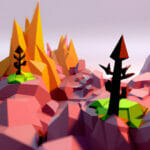Are you an aspiring game developer looking for a comprehensive guide to start your journey? Or perhaps a seasoned veteran trying to navigate the latest trends and game development platforms? Either way, you’ve come to the right place. This article will help you understand what game development is, the popular game engines to consider, and why it’s a career worth exploring.
Our guide will also provide you with some valuable resources and course recommendations to help jumpstart your journey or take your skills to the next level. Game development offers a unique blend of creativity and technical prowess, and, with proper guidance and resources, you can become a part of this exciting field.
Table of contents
What is Game Development?
Game development refers to the process of creating games – an endeavour that comprises design, coding, sound design, art, and more. It can be carried out by individuals or by teams in gaming studios. With the help of a variety of game development engines, the process has become more accessible, even to those without extensive coding skills.
There are two main streams of game development: commercial and independent. Commercial games are typically developed by large teams, funded by publishers, and can take two to five years to complete. Independent development, on the other hand, is executed by smaller teams or individuals and is often self-funded. The gaming industry is alive with innovation and continually evolving, necessitating constant learning and upskilling for game developers.
Popular Game Development Engines
When it comes to actual game creation, game development engines are an essential tool. They provide pre-made functions and a user-friendly interface, making the process smoother and more manageable. Here are a few of the most popular game development engines:
- Unity: One of the world’s most popular game engines, Unity offers wide-ranging resources for both 2D and 3D development. It’s used extensively in industries beyond gaming, like film, architecture, and education, making it a versatile skill to learn.
- Unreal Engine: Known for its state-of-the-art graphics, Unreal Engine is used widely in 3D game development. Its ease of use makes it suitable for beginners and seasoned developers alike.
- Godot: An open-source game engine, Godot is perfect for 2D and 3D game development. With its unique scene system and supportive community, it is an excellent option for independent developers.
- Roblox: Ideal for those who want to develop multiplayer online games, Roblox is an engine that’s garnered immense popularity in recent years. Its studio allows developers to create immersive, interactive experiences for its millions of global players.
- Phaser: For those interested in developing HTML5 games, Phaser is a fast, free, and fun open-source framework. It requires basic skills in JavaScript and offers access to a world of plugins and extensions.
Choosing the right game engine depends on your goals, your project, and your skillset, but familiarizing yourself with these industry leaders is a good place to start.
Why Become a Game Developer?
The world of game development is ripe with opportunity. It offers a chance to tap into your creativity, combine it with technical skills, and actually see your visions come to life on screen. Besides, the gaming industry is booming, and the demand for skilled game developers is higher than ever.
Here are some reasons why you should consider a career in game development:
- Creativity and Innovation: Game development allows you to channel your creativity into something tangible – eschewing the boundaries of reality to create new worlds, characters, and adventures.
- Diverse Industry: The gaming industry is incredibly diverse, encompassing different genres, platforms, and styles. Whether you’re interested in VR, mobile games, PC games, console games, or something else entirely, there’s room for you.
- High Demand: With the explosive growth of the gaming industry, there’s a high demand for talented game developers. This job security, combined with competitive salaries, makes game development a financially rewarding career.
- Rapid Growth and Learning: As technology advances, so does game development. This field requires continual learning and adaptation, guaranteeing that you’ll never be bored and there’s always room for progression.
- Contribute to Entertainment: Games bring joy and entertainment to millions of people worldwide. Being a game developer offers a unique opportunity to directly contribute to this global entertainment medium.
As a game developer, not only will you have the chance to use your imagination and creativity, but you will also become part of a thriving industry filled with passionate individuals eager to create and innovate. Now is the best time to consider a career in game development.
How to get started with Game Development?
Starting a career in game development may seem intimidating at first, but with the right steps and resources, it can be an exciting and fulfilling journey. Here’s a general roadmap you can follow:
- Start with the Basics: Begin by understanding the basics of game development. Familiarize yourself with simple game mechanics, different genres, game design principles, and introductory coding.
- Choose and Learn a Game Development Engine: As mentioned earlier, game engines are crucial for building games. Choose one that aligns with your aims and interests, and start learning. There are numerous online resources, tutorials, and courses available to help you master these tools.
- Start Creating: The best way to learn game development is by doing it. Start small – create a simple game or clone a classic one. Gradually move on to more complex projects as you gain experience and confidence.
- Collaborate and Network: Work on projects with others, join online communities, or participate in game jams. These can provide priceless experience, new perspectives, and may even lead to job opportunities.
- Stay Updated: The world of game development is forever changing. Stay updated with the latest trends, techniques, and tools to keep your skills sharp and relevant.
With persistence and the right resources, anyone can become a game developer. It’s a journey of constant learning and immense creativity.
If you are planning to dive into game development, our Unity Game Development Mini-Degree is a comprehensive and beginner-friendly starting point. It covers everything from the basics of game development to advanced concepts, and by the end of it, you’ll have a portfolio of your very own games developed in Unity.
Our courses are designed by competent instructors who understand the learning hurdles in game development. At Zenva, our prime focus is to make sure learners are equipped with real-world skills that they can immediately apply in their projects or careers. We believe in learning by doing, therefore our Unity Game Development Mini-Degree is project-based, helping you solidify your knowledge through application. You’ll learn to create actual games, all while you grasp the fundamental and complex concepts behind them.
Zenva’s flexible online learning platform allows you to learn at your own pace, from the comfort of your home. Start your game development journey with us and unfold a world of endless creative possibilities.
Learning Resources
There are a plethora of high-quality learning resources available online to kick-start or further advance your journey into game development. Here, we round up some of the top resources that we believe would be beneficial for both beginners and experienced developers.
Unity Game Development Mini-Degree by Zenva
This comprehensive collection of courses teaches game development using one of the world’s most popular game engines – Unity. Access the Unity Game Development Mini-Degree and explore various aspects of game development.
- Learn about game mechanics, cinematic cutscenes, audio effects, custom game assets, procedural maps, enemy AI, and animation.
- The course is suitable for beginners and those looking to further their skills.
- Learning Unity opens up opportunities in industries beyond gaming, such as architecture, film, animation, automotive, education, healthcare, and engineering.
Unity 101 – Game Development Foundations
Start your journey into game development with this free course titled Unity 101 – Game Development Foundations.
- Master the basics of Unity, navigating the editor, editing game objects, applying materials, adjusting lights and physics, and creating C# scripts.
- No prior Unity skills or programming experience are required.
- A certificate of completion is offered upon finishing the course.
Godot 101 – Game Engine Foundations
Understand the basics of the open-source game engine, Godot with this comprehensive course on Godot 101 – Game Engine Foundations.
- Learn to use engine tools, set up nodes and scenes, work with 3D and 2D, add lighting, create scripts, and use variables in GDScript.
- The course offers 1.5 hours of on-demand video content, perfect for beginners getting started with Godot.
Unreal Engine 101 – 3D Game Creation
Dive into the world of 3D game development using Unreal Engine with this beginner-friendly course, Unreal Engine 101 – 3D Game Creation.
- The course covers the basics of setting up the engine, manipulating game objects, lighting, physics, and more.
- Upon completion, you’ll receive a certificate that can bolster your portfolio.
Roblox 101 – Game Making Fundamentals
Discover how to create games on the Roblox platform, a platform popular among millions of players worldwide, through this Roblox 101 – Game Making Fundamentals course.
- The course guides you through installing Roblox Studio, navigating the editor, adding, and manipulating objects.
- No previous programming or Roblox experience is required, making it a great start for beginners.
Phaser 101 – Introduction to Game Development
Learn how to create HTML5 games using the Phaser 3 JavaScript library with the course Phaser 101 – Introduction to Game Development.
- The course covers setting up the development environment, rendering sprites and graphics, scaling and flipping, and rotation.
- While the course is designed for beginners, basic skills in JavaScript are required.
Developing Games with Python and Pygame
Explore how to construct games with Python using the most-recognized Python game development library: Pygame. Developing Games with Python and Pygame will show you:
- How to work with game objects and build windows to show them
- Work with events to trigger game actions
- Moving objects based on user input
These resources provide an excellent starting point in your game development journey. Each platform’s flexibility and ease of use make it ideal for learners at all levels. Remember, the key to becoming a successful game developer lies in constantly learning, practicing, and creating!
What is Game Development – Wrap-Up
Your journey into the world of game development can begin right here, right now. With the right mindset, the right resources, and perseverance, the possibilities are limitless. Don’t be daunted by the variety and complexity of the field; instead, use it as fuel for your creativity.
Keep in mind that expertise comes with time and practice. Ensure that you continually learn, experiment, and enhance your skills. Don’t pressurize yourself to master everything quickly; the journey of learning is a marathon, not a sprint. Each project you create, each concept you understand, brings you one step closer to your goal.
Start your journey with our Unity Game Development Mini-Degree, a comprehensive and project-based primer into the universe of game development. Building your own portfolio as you learn, mastering industry-standard tools, learning at your own pace – these are just some of the ways Zenva empowers you to kick-start your game development journey.
Remember, behind every groundbreaking game is a developer who once started from scratch. That could be you. So buckle up, dive in, and start creating!
Did you come across any errors in this tutorial? Please let us know by completing this form and we’ll look into it!

FINAL DAYS: Unlock coding courses in Unity, Godot, Unreal, Python and more.







